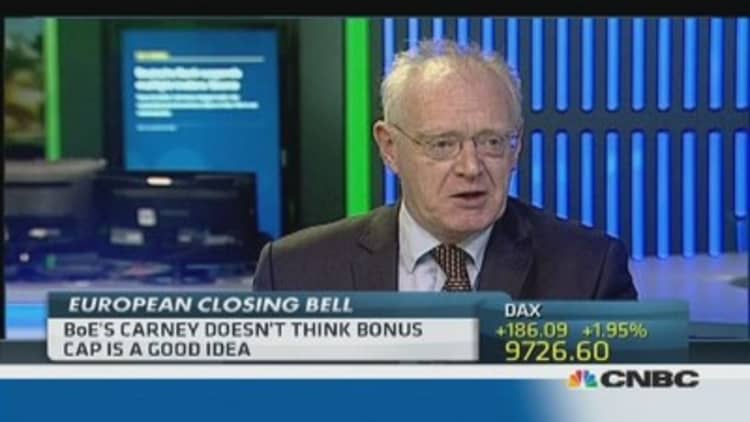It shouldn't have come as a surprise that Royal Bank of Scotland's largest shareholder, the U.K. government, stopped the bank from trying to waive new European Union rules limiting bonuses.
The peevish tone of RBS's announcement of the decision, which noted that it disagreed with the decision and that the board of the bank thought it would create "commercial and prudential risk," was rather more surprising. Yet it is not the only U.K. bank to get in a huff with a major investor for not backing its pay plans this week. The often cozy relationship between major institutions and the board of big corporates seems to be fracturing in many cases.
Sir John Sutherland, chair of Barclays' remuneration committee, publicly expressed annoyance at Standard Life for not raising the pay issue in earlier discussions. Shareholders representing nearly a quarter of Barclays shares voted against the remuneration report his committee came up with, which raised the bank's bonus pool for 2013 despite a fall in profits.
Sports Direct also went on the record with its board's anger against shareholders who refused to back a proposed £65 million pay packet for founder Mike Ashley, who subsequently sold off £200 million worth of shares in the company.
Read MoreUK bankers face bonus clawback in clampdown
The sense of petulance towards major shareholders in all these cases did not sit well. The contract between shareholders and the board is one of the fundamental tenets of capitalism.
A substantial minority vote against board proposals doesn't mean the company has to take action – but it makes for an uncomfortable time. When a figure as prestigious as Jean-Philippe Courtois, president of Microsoft International and a non-executive director at AstraZeneca, has shareholders representing nearly half of the shares in the company voting against him continuing, it shows the depth of anger against perceived fat cats. In Courtois' case, objections were founded in his poor attendance at board meetings.
Read MoreThe new generation of activist investors: Carl Icahn

In the case of RBS, the bank owes its continued existence to UKFI – the U.K. government's investment vehicle used to invest in failing banks - and has yet to resume paying dividends. "An increase to the bonus cap cannot be justified and the government made clear it would not have supported such a proposal," the Treasury said in a statement.
For Barclays, if enough shareholders decide, as one small shareholder said at the annual general meeting, that they are "paying for Manchester United and getting Colchester United," and offload their shares, the pressure on management will build.
Read More UK banking bonuses up as cap row looms
The comparison between paying for executives or traders and expensive top flight footballers is often, and wrongly, made. After all, footballers are pretty unique specimens physically and mentally, and have a limited time frame in which to make as much money as possible before injury or old age cut their careers short. Bright young graduates, who can be trained to make reasonable returns from foreign exchange or bonds trading, are rather easier to locate than the next David Beckham.
Football clubs inspire much more genuine loyalty through good times and bad in fans than companies do in their shareholders. And, of course, footballers regularly receive and deal with much worse heckling than bankers - although we have yet to see a bank executive deal with rowdy shareholders the Cantona karate kick way.
In an era where shareholder activism is increasingly powerful, all board members will have to be on guard.


